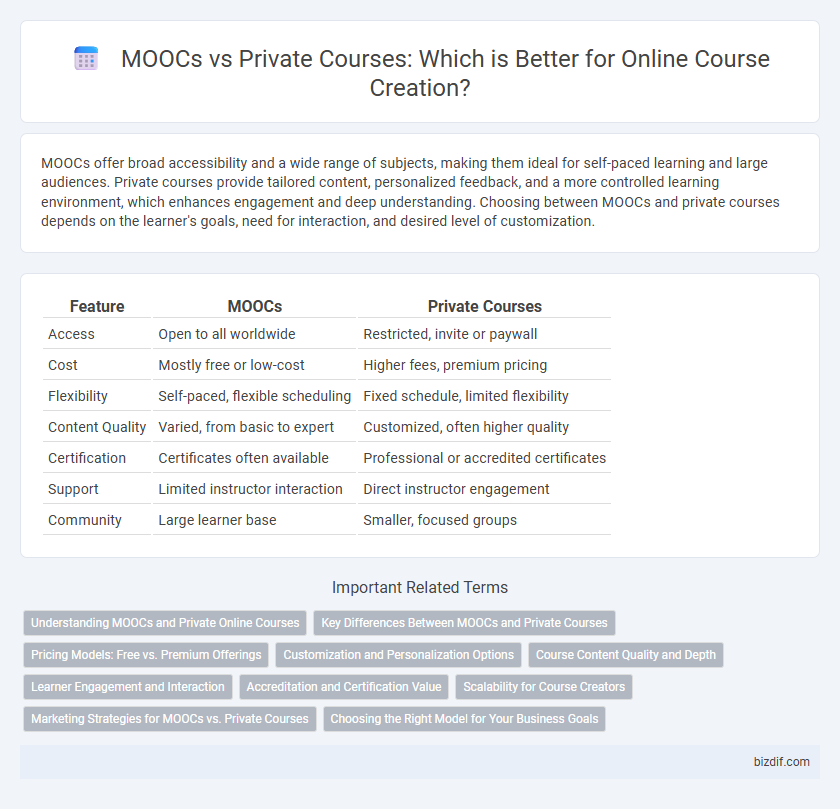MOOCs offer broad accessibility and a wide range of subjects, making them ideal for self-paced learning and large audiences. Private courses provide tailored content, personalized feedback, and a more controlled learning environment, which enhances engagement and deep understanding. Choosing between MOOCs and private courses depends on the learner's goals, need for interaction, and desired level of customization.
Table of Comparison
| Feature | MOOCs | Private Courses |
|---|---|---|
| Access | Open to all worldwide | Restricted, invite or paywall |
| Cost | Mostly free or low-cost | Higher fees, premium pricing |
| Flexibility | Self-paced, flexible scheduling | Fixed schedule, limited flexibility |
| Content Quality | Varied, from basic to expert | Customized, often higher quality |
| Certification | Certificates often available | Professional or accredited certificates |
| Support | Limited instructor interaction | Direct instructor engagement |
| Community | Large learner base | Smaller, focused groups |
Understanding MOOCs and Private Online Courses
Massive Open Online Courses (MOOCs) offer wide accessibility and free or low-cost education to millions worldwide, often provided by universities or large platforms like Coursera and edX. Private online courses cater to niche audiences with specialized content, personalized support, and controlled enrollment, making them ideal for targeted skill development or corporate training. Understanding the distinct benefits and limitations of MOOCs versus private courses helps educators and learners choose the best format for scalability, engagement, and monetization.
Key Differences Between MOOCs and Private Courses
MOOCs (Massive Open Online Courses) offer wide accessibility with thousands of learners and standardized content, while private courses provide personalized instruction tailored to specific audiences or organizations. MOOCs typically feature fixed schedules and limited instructor interaction, whereas private courses allow flexible pacing and direct communication with instructors. Pricing models also diverge, with MOOCs often free or low-cost and private courses generally requiring higher fees for customized content and exclusive support.
Pricing Models: Free vs. Premium Offerings
MOOCs typically adopt a freemium pricing model, offering free access to course content with optional paid certificates or premium features, attracting a broad audience and minimizing entry barriers. Private courses often use premium pricing, providing exclusive content, personalized support, and community access, creating higher perceived value and generating increased revenue per learner. Understanding these pricing dynamics helps educators strategically position their online courses to balance accessibility and profitability.
Customization and Personalization Options
MOOCs typically offer standardized content with limited customization, catering to large audiences through fixed curricula and automated assessments. Private courses excel in personalization by allowing tailored content, flexible pacing, and direct interaction with instructors, enhancing learner engagement and outcomes. These customization options make private courses ideal for specific skill development and niche topics where individual feedback is critical.
Course Content Quality and Depth
MOOCs generally offer broad course content designed for a wide audience, which can limit depth and customization; in contrast, private courses often provide more specialized, in-depth material tailored to specific learner needs. Private course creators have greater control over content quality, allowing for frequent updates and personalized feedback, enhancing the overall learning experience. The focused nature of private courses typically results in higher engagement and deeper understanding compared to the standardized structure of many MOOCs.
Learner Engagement and Interaction
MOOCs often struggle with learner engagement due to high enrollment numbers and limited personalized interaction, resulting in lower completion rates compared to private courses. Private courses enhance engagement by offering tailored content, direct instructor support, and interactive elements such as live sessions and discussion forums. This personalized approach fosters deeper interaction, motivation, and a stronger sense of community among learners.
Accreditation and Certification Value
MOOCs offer broad accessibility but often provide certificates with limited accreditation recognized by employers and institutions. Private courses typically deliver accredited certifications that hold greater credibility and can enhance professional credentials more effectively. Choosing a course with accredited certification boosts career advancement opportunities and validates skill mastery in specialized fields.
Scalability for Course Creators
MOOCs offer unparalleled scalability by accommodating thousands of learners simultaneously, making them ideal for course creators seeking mass outreach and brand building. Private courses provide more controlled, customizable environments, enabling personalized learning experiences while limiting scalability due to smaller class sizes. Course creators must balance broad accessibility in MOOCs against the depth of engagement in private courses to maximize growth and learner satisfaction.
Marketing Strategies for MOOCs vs. Private Courses
MOOCs leverage broad marketing channels such as social media, email campaigns, and partnerships with educational platforms to attract a global audience, emphasizing free or low-cost access and scalable enrollment. Private courses employ targeted marketing strategies including personalized outreach, niche community engagement, and high-touch sales funnels to appeal to specific demographics willing to invest in premium content. Understanding audience segmentation and value proposition clarity are critical to optimizing marketing efforts for MOOCs and private courses.
Choosing the Right Model for Your Business Goals
MOOCs offer broad reach and brand recognition, ideal for educational institutions targeting mass audiences; private courses provide personalized experiences and higher profit margins, suitable for niche experts aiming for direct client engagement. Selecting the right model depends on your business goals, whether scaling user base or maximizing revenue per student. Analyzing target audience size, content customization needs, and marketing strategies ensures aligning course format with long-term growth objectives.
MOOCs vs Private courses Infographic

 bizdif.com
bizdif.com